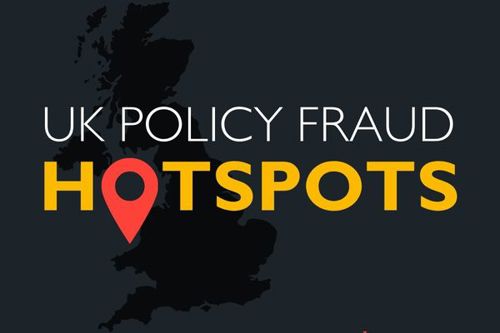The UK’s top policy fraud hotspots revealed as public warned of rise in identity theft

The UK’s worst-affected areas for policy fraud have been revealed to help protect people at risk, following record-high cases of identity theft.
Policy fraud is when an insurance application is made using stolen or false details. Much of this involves criminals stealing personal information to take out fraudulent policies that enable wider scams, leaving victims in distress and financial hardship. Other cases include people misrepresenting their own information to reduce premiums.
For the first time, an analysis of over 2.4 million insurance policies by the Insurance Fraud Bureau (IFB) has revealed the top policy fraud hotspots. In England, areas in West Yorkshire, Greater Manchester and the West Midlands top the list. While Glasgow leads in Scotland, areas in the Isle of Anglesey in Wales, and County Fermanagh in Northern Ireland top their respective hotspot lists.
The hotspots follow an unprecedented rise in identity theft, with the IFB reporting a seven‑fold increase in stolen details used for insurance scams over the past year. As a result, the public is urged to watch out for signs of their details being misused and report insurance fraud to CheatLine.
Top policy fraud hotspots
ENGLAND
- Bradford, West Yorkshire
- Oldham, Greater Manchester
- Birmingham, West Midlands
- St Just (surrounding)*, Cornwall
- Kington Rural, Herefordshire
- Leeds, West Yorkshire
- Winkleigh, Devon
- Stapleford Abbotts, Essex
- Dewsbury, West Yorkshire
- Bournemouth
- Walsall, West Midlands
- Bromley, Greater London
- Newcastle Upon Tyne, Tyne and Wear
- Lyme Regis, Dorset
- Chawleigh, Devon
- Sheffield, South Yorkshire
- Nelson, Lancashire
- Send (surrounding)*, Surrey
- Huddersfield, West Yorkshire
- Rotherham, South Yorkshire
SCOTLAND
- Glasgow
- Greenlaw, Scottish Borders
- Kirkwall, Orkney Islands
- Wick, Highland
- Aberfeldy, Perth and Kinross
- Dingwall, Highland
- Thornliebank, East Renfrewshire
- Mauchline, East Ayrshire
- Orkney, Orkney Islands
- Kingussie, Highland
WALES
- Cemaes Bay, Isle of Anglesey
- Newport
- Wrexham
- Betws-y-Coed, Conwy
- Pencaer, Pembrokeshire
- Penygroes (surrounding)*, Gwynedd
- Welshpool, Powys
- Bangor, Gwynedd
- Haverfordwest, Pembrokeshire
- Llanfyllin (surrounding)*, Powys
NORTHERN IRELAND
- Enniskillen, Co. Fermanagh
- Belfast, Co. Antrim
- Newry, Co. Down
- Omagh, Co. Tyrone
- Dungannon, Co. Tyrone
- Londonderry, Co. Londonderry
- Lurgan, Co. Armagh
- Bangor, Co. Down
- Ballymena, Co. Antrim
- Downpatrick, Co. Down
Jon Radford, Head of Intelligence, Investigations and Data Services at the IFB, said:
“Insurance scams using stolen details are on the rise, indicating more people are being targeted with identity theft. We’ve launched a Prevention campaign to urge everyone to stay alert, particularly those in hotspot areas, against signs of their personal information being used in fraudulent insurance applications.
“While anyone can be targeted, insights suggest insurance fraudsters often steal details from those they believe are cheaper and easier to insure - including people over 60, or individuals seen as financially secure or low-risk.
“We’re working with insurers, police and industry watchdogs to tackle the issue and urge anyone who thinks their details have been used in an insurance scam to report it to our CheatLine.”
Record-high in stolen identities fueling insurance fraud
New IFB figures show that there has been a year-on-year rise in cases of identity theft linked to organised insurance fraud networks, with levels now over seven times higher since 2021.
An increase in data phishing scams has also been detected by the organisation.
The rise follows a recent announcement by Cifas, a not-for-profit organisation which protects public, private and voluntary sectors from fraud, who has reported a 25% rise in insurance fraud, linked to identity theft and false applications.
Insurance fraudsters often use stolen details to take out fraudulent insurance policies to facilitate a wide range of harmful scams.
Examples include taking out fraudulent policies in the names of people who are cheaper to insure and then selling them on as doctored certificates to unsuspecting victims - in a scam known as ghost broking. Stolen details have also been used to facilitate crash for cash scams which involve fake motor claims, as well as using misrepresented policies to steal cars through fraudulent finance arrangements.
The consequences can be severe for victims.
Fraudsters can impersonate someone with just a few stolen details, such as name, date of birth or home address, to carry out insurance, banking and credit fraud. Victims may then be pursued by third parties seeking to recover costs from arrangements made in their name, damaging credit scores and making it hard to secure loans, credit cards or mortgages for years to come.
Simple measures can protect personal information:
- Create strong, unique passwords for personal accounts.
- Avoid sharing personal details on social media.
- Shop only on legitimate retailers’ websites and never give bank details to unknown parties.
- Keep devices secure by installing software and app updates promptly, and enable two-factor authentication where possible.
- Watch out for phishing and vishing attempts - never click on suspicious links or open unexpected files or reveal personal details to unsolicited calls or text messages.
Twisting the truth on insurance applications
While identity theft is a key driver in policy fraud, there may also be instances of opportunistic fraud in hotspot areas, with people using false details to reduce insurance costs, such as by submitting a false no claims discount (NCD) or not disclosing a full driving history.
A YouGov survey (commissioned by the IFB in 2024) found that nearly one in five people (17%) would find it acceptable to lie on an insurance application to help save money. An issue potentially linked to financial hardship.
To help protect people from making a costly mistake, the IFB has been reminding the public through its ongoing Fraud Cons campaign, that what might seem like a small lie to save on the cost of insurance is still fraud. This could lead to a record on the Insurance Fraud Register (IFR), making it harder to get insurance for years to come, and a potential criminal charge.
Being truthful from the start is the safest way to stay protected.
Mark Allen, Head of Fraud and Financial Crime at the ABI, said:
“Amidst an increase in identity theft – which is often aided by the use of generative AI – it’s essential that consumers remain vigilant to protect their personal information from policy fraudsters. The IFB’s findings underscore the evolving nature of this crime and its impact on victims when false insurance policies are taken out or fraudulent claims are made using their details.
“At the same time, it’s vital that customers are honest and accurate when applying for their own insurance. Even small misrepresentations or omissions in an application can constitute policy fraud, leading to potentially serious legal and financial consequences. By protecting yourself from fraudsters and ensuring your own actions are above board, you can help maintain a fair and secure insurance market for all.”
Detective Chief Inspector Nik Jethwa, from the City of London Police’s Insurance Fraud Enforcement Department (IFED), said:
“Policy fraud is a growing threat that often flies under the radar, but its impact is anything but invisible. Whether it’s criminals using stolen identities to take out fake insurance policies or individuals deliberately misrepresenting their details to cut costs, the consequences can be serious and far-reaching.
“Fraudulent policies don’t just distort the insurance market -they’re often used to enable wider criminal activity, from ghost broking to crash for cash scams. That’s why we’re working closely with the Insurance Fraud Bureau and industry partners to identify hotspot areas and disrupt these networks.
“We urge the public to stay alert. If something doesn’t feel right whether it’s a suspicious policy offer or signs your personal details have been misused - report it to Action Fraud. A few minutes of caution could prevent months of financial loss and emotional distress.”
Report insurance fraud
The IFB is a not-for-profit organisation which leads the insurance industry’s collective fight against insurance fraud. Evidence of an insurance scam can be reported to the IFB’s confidential CheatLine online or via 0800 422 0421.
It can also be reported to Action Fraud - the national reporting centre for fraud and cybercrime.
Advice is available to help anyone who believes their details may have been used in policy fraud.
___
*Hotspots with surrounding areas
England, no. 4, St Just (surrounding), Cornwall, includes:
Boscaswell, Botallack, Carn Towan, Kelynack, Pendeen, Porthcurno, Sennen, Sennen Cove, St Buryan, St Just, Treen, Tregiffian
England, no. 18, Send (surrounding), Surrey, includes:
Ockham, Ripley, Send, Wisley
Wales, no. 6, Penygroes (surrounding), Gwynedd, includes:
Carmel, Clynnog Fawr, Groeslon, Llanllyfni, Llanaelhaearn, Llandwrog, Penygroes, Rhosgadfan, Rhostryfan, Talysarn, Trefor, Upper Llandwrog
Wales, no. 10, Llanfyllin (surrounding), Powys, includes:
Arddleen, Four Crosses, Llandrinio, Llanfyllin, Llanfechain, Llansantffraid-ym-Mechain, Llanymynech, Meifod, Pant, Pen-y-bont-fawr


